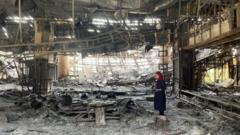The decision to delist Hayat Tahrir al-Sham (HTS) as a foreign terrorist organization indicates a significant shift in US policy towards Syria, coinciding with broader geopolitical changes and the nation’s struggle for recovery post-civil war.
US to Reassess Terror Designation of Syria’s HTS Amid Shifting Political Landscape

US to Reassess Terror Designation of Syria’s HTS Amid Shifting Political Landscape
The US is poised to remove Hayat Tahrir al-Sham (HTS) from its foreign terror list, reflecting changing relations with Syria following the ousting of the Assad regime.
The US is set to officially remove the Syrian Islamist organization Hayat Tahrir al-Sham (HTS) from its foreign terrorist organizations list, as noted in a memo from the state department. This change is anticipated to occur on Tuesday and marks a pivotal moment for the group, which played a key role in a rebel-led offensive that resulted in the fall of the Assad regime, in power for over five decades. Ahmed al-Sharaa, the group's leader, has emerged as Syria's interim president following these events.
Previously known as the al-Nusra Front, HTS was affiliated with al-Qaeda until breaking away in 2016 under al-Sharaa’s leadership. The recent delisting comes amid a wider Western effort to reassess relations with Syria, particularly given the heavy sanctions imposed on the country under the previous regime. In June, former President Trump took a notable step by signing an executive order to lift sanctions, emphasizing the US's intention to assist Syria’s transition towards stability and peace.
The US added it would keep a close eye on the actions of the new Syrian government, highlighting the need for improvements in relations with Israel and a commitment to address foreign terrorist elements as well as banning Palestinian terrorist organizations. Syrian Foreign Minister Asaad al-Shibani welcomed the move, stating that it would facilitate economic recovery and reintegrate the country into the global community.
In a notable diplomatic visit, UK Foreign Secretary David Lammy recently traveled to Syria, marking the first visit by a British minister since the 2011 uprising. His discussions with al-Sharaa included a commitment of an additional £94.5 million to support Syria's long-term recovery and aid for Syrian refugees. The UK had previously lifted sanctions targeting Syria’s defense and interior ministries, in line with this new diplomatic approach.
Despite the promised changes from al-Sharaa, there remains significant unease among the population concerning the new government’s direction. Critics express concern about HTS's radical past and the lack of gender representation—only one female minister has been appointed so far from a predominantly male cabinet. Additionally, the region has experienced alarming violence, with attacks on minority groups, including a brutal incident in March that resulted in the deaths of hundreds from the Alawite sect.
With escalating tensions and the potential for more conflict, the broader international response to Syria's evolving leadership continues to be under scrutiny, raising questions about the future stability and governance trajectory of the nation.



















